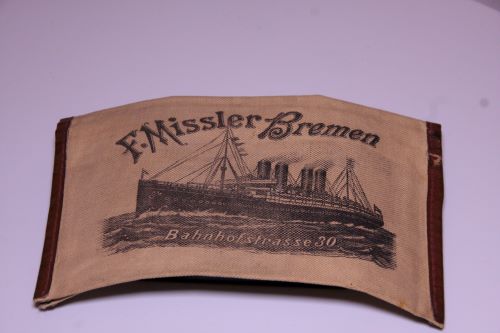Emigrating to the United States proved difficult for Poles during the late 1800s and early 1900s. Government officials in the Austro-Hungarian Empire passed laws to discourage such emigration due to suspected harsh work conditions faced by emigrant Poles in America. Despite laws preventing the advertisement of transatlantic passage, shipping companies such as F. Missler in Bremen, Germany, managed to continue their mission. This wallet attests to that company’s ongoing efforts to provide a way for Polish emigrants to emigrate to America.
This cloth wallet, and the contract that goes with it, belonged to a Polish person who traveled to Springfield, Massachusetts in 1899. This individual traveled on a ship operated by the F. Missler shipping company, which was responsible for transporting 60-80,000 Poles to the United States between 1880 and 1920 from the German port of Bremen. Most Poles who left German-occupied Poland in the 1870s-1890s did so as part of families. The owner of this wallet, however, left in 1899, after Polish emigration from the German partition had crested. This individual was likely from either the Austrian or Russian partitions where the lack of agricultural employment caused many young women and men to leave. If the men were of military age, they would need to be careful not to be stopped on the border by the authorities who discouraged shipping companies from promoting emigration. Nevertheless, the combination of the letters from family members in the United States and the abundance of ticket agents for steamship companies like F. Missler in Polish villages ensured a steady stream of emigrants in the years before World War I.
Author: Xamilka Lugo, Nursing major, Elms College.
